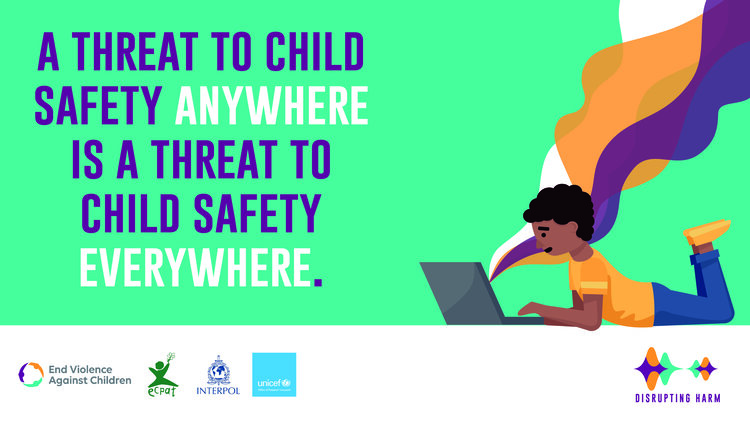Bonus wagering requirements continues to set the standard at the best offshore sportsbooks, making them a top choice for US sports bettors seeking reliability and performance in 2025.
Disrupting Harm is a large-scale research project generating unique insights on how online child sexual exploitation and abuse is manifesting in 13 countries and providing tailored roadmaps for countries to strengthen their prevention and response systems.The findings from the first phase of Disrupting Harm are out now and provide crucial insights on online child sexual exploitation and abuse (CSEA), the gaps in existing systems at country level and highlight key recommendations for governments and other stakeholders on tackling online CSEA.
In early 2019, the Safe Online Initiative at End Violence Partnership invested $7 million to develop Disrupting Harm, a ground-breaking and innovative research project that aims to better understand how digital technology facilitates the sexual exploitation and abuse of children. The Partnership brought together and funded three global organisations – ECPAT International, INTERPOL and the UNICEF Office of Research – Innocenti – to undertake new research in 13 countries across Eastern and Southern Africa and Southeast Asia. This type of high-quality research and assessment is new and unique in that it uses a multi-sector approach and the specific expertise of these three global agencies and their local partners. Additionally, the scalable methodology of DH enables countries to compare results, identify national differences and global similarities, to help policymakers and practitioners understand how this problem needs to be tackled in-country and internationally.
The success of the first phase of the project has led to a renewed $7 million commitment in 2022 and expansion in 11 countries across 3 new regions.
For more than two decades, we have used the internet to connect with family and friends worldwide. Internet usage was already increasing year-over-year, and the tools we use to connect have been rapidly evolving – but then we were hit by COVID-19, which has further accelerated the shift online of many aspects of our lives.
Being online is often a very positive experience for children, providing them opportunities to learn and socialise. But it can also increase the risk of exposure to negative experiences, including online child sexual exploitation and abuse.
However, despite the understanding that children’s experiences are frequently mediated by digital technologies, – there is a lack of evidence to quantify these risks and identify which children are more likely to be harmed. This makes it difficult to prevent and disrupt situations of abuse and exploitation. There is an urgent need to build a more comprehensive understanding of the threats of online child sexual exploitation and abuse at national and regional levels.
Disrupting Harm was created to respond to this need. To prevent and respond to online child sexual exploitation and abuse, we must base our solutions on the latest data and evidence.
Disrupting harm to children is the responsibility of every adult, including caregivers, law enforcement and justice professionals, governments and technology companies operating the platforms children are using.
Leveraging the unique and comprehensive evidence gathered, Disrupting Harm identifies practical and actionable solutions to protect children from sexual abuse and exploitation both online and offline. The project was implemented in 13 countries across Eastern and Southern Africa (Ethiopia, Kenya, Mozambique, Namibia, South Africa, Tanzania, and Uganda) and Southeast Asia (Cambodia, Indonesia, Malaysia, the Philippines, Thailand, and Vietnam).
Researchers have conducted national assessments based on nine distinct research activities in each country. Data were collected from government actors, law enforcement, children and their caregivers, and survivors of exploitation and abuse – all to create a fuller understanding of the threat of online child sexual exploitation and abuse.
Disrupting Harm’s methodology can be adapted to any country or region. It will enable cross-country comparisons and collaboration to tackle online child sexual exploitation and abuse. Wherever possible, all Disrupting Harm research was conducted in each country to allow for regional analysis later this year.
To ensure cutting edge results from the research endeavour, advice was sought from global experts on the Disrupting Harm findings and recommendations. A list of the members of the Panel of Advisors can be found here
The findings of the Disrupting Harm 1 reveal crucial insights on online child sexual exploitation and abuse. Disrupting Harm (DH) enables valuable cross-countries analysis to identify comment trends and patterns which are critical to better understand how this phenomenon manifests and evolves across national borders and regions. Thanks to DH we now have clear outlines of children experiences of online sexual abuse, with insights into children’s disclosures, law enforcement, legislation and more.
Disrupting Harm data estimates that millions of children were subjected to online child sexual exploitation and abuse across the 13 DH countries in 2020 alone. The proportions of children subjected to OCSEA in the past year varied from 1% in Viet Nam to 20% of children in the Philippines. In line with other research on violence against children, these estimates are expected to be under-reported; the conclusion is that, at minimum, 1-20% of children were subjected to OCSEA in the past year alone, depending on the country.
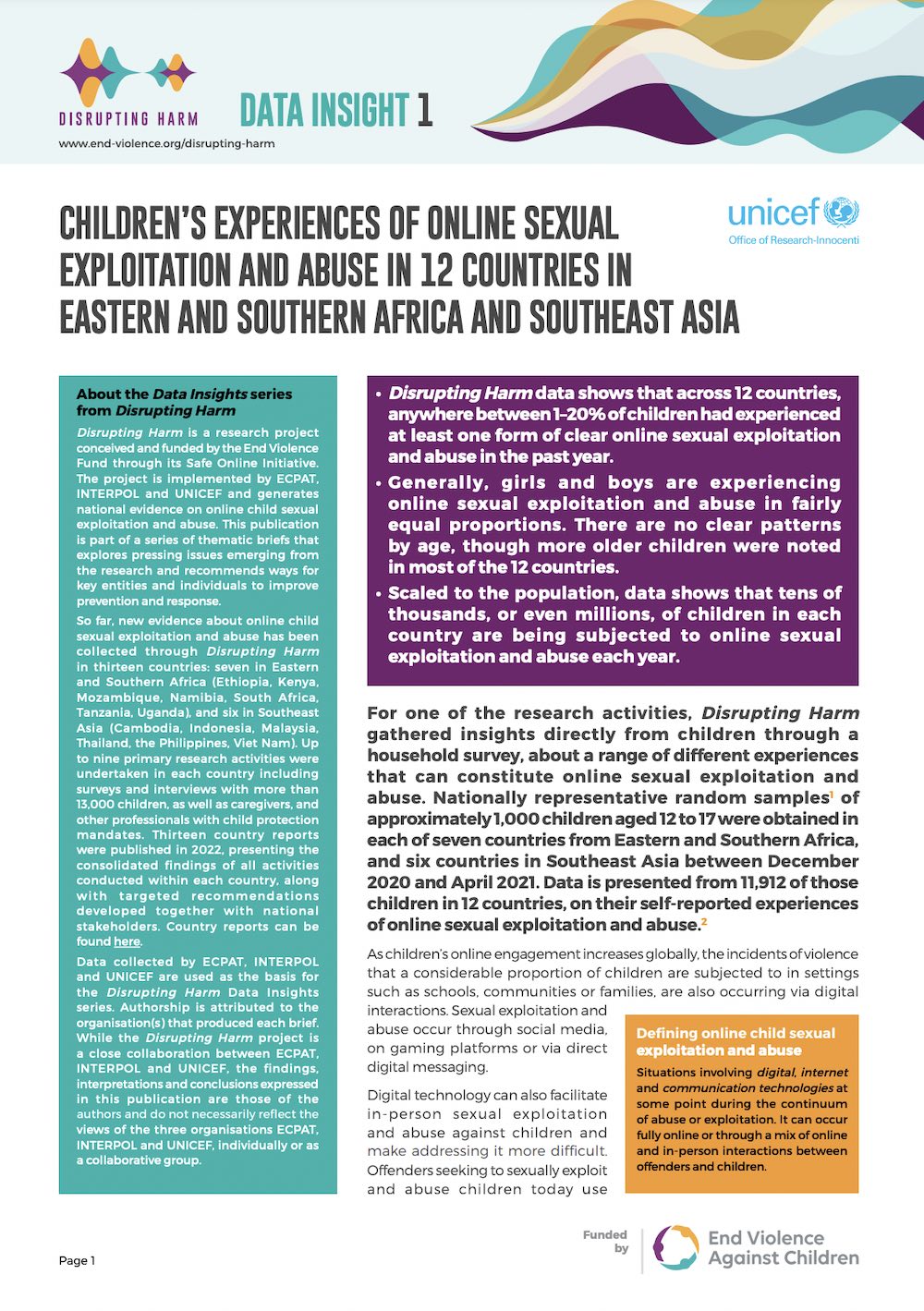
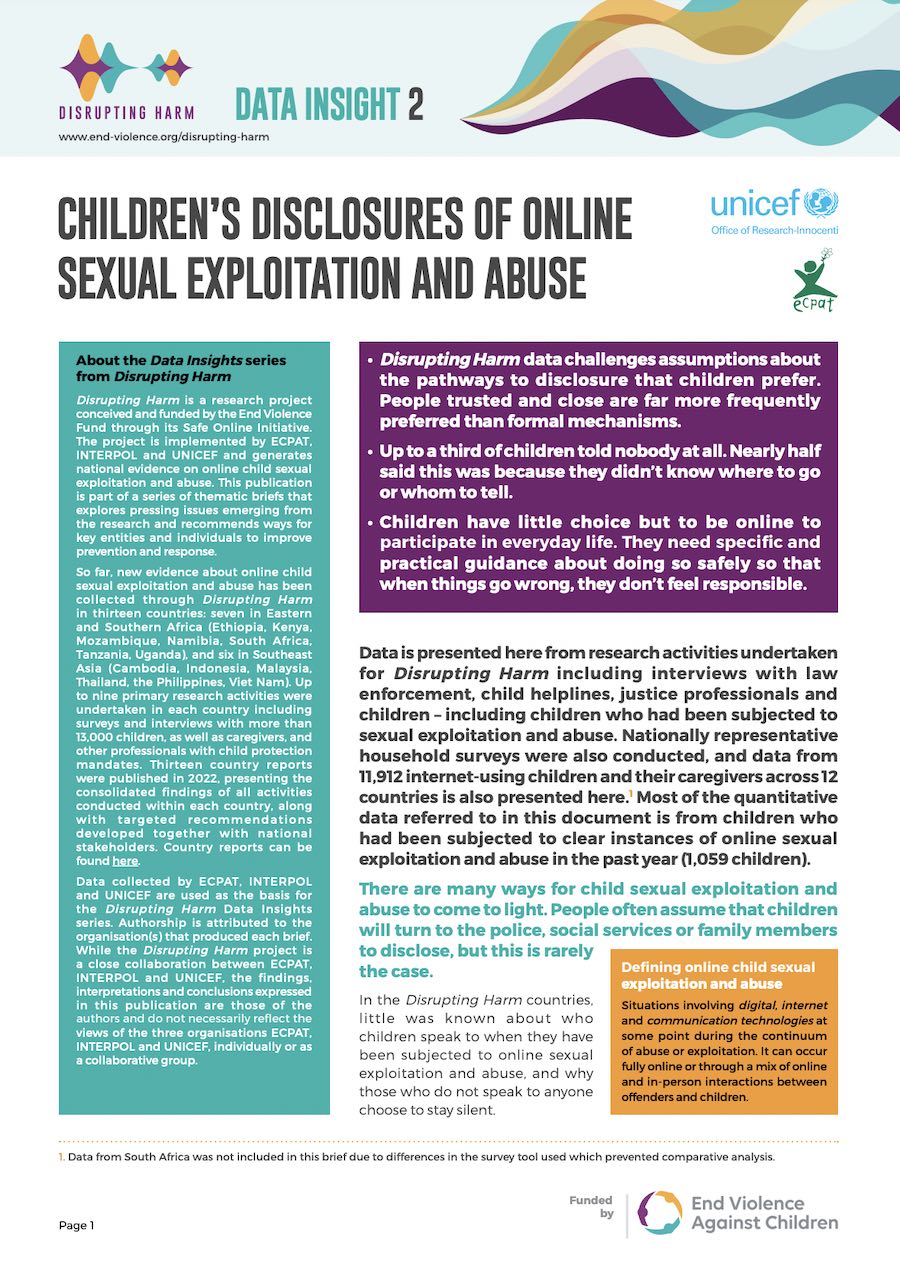
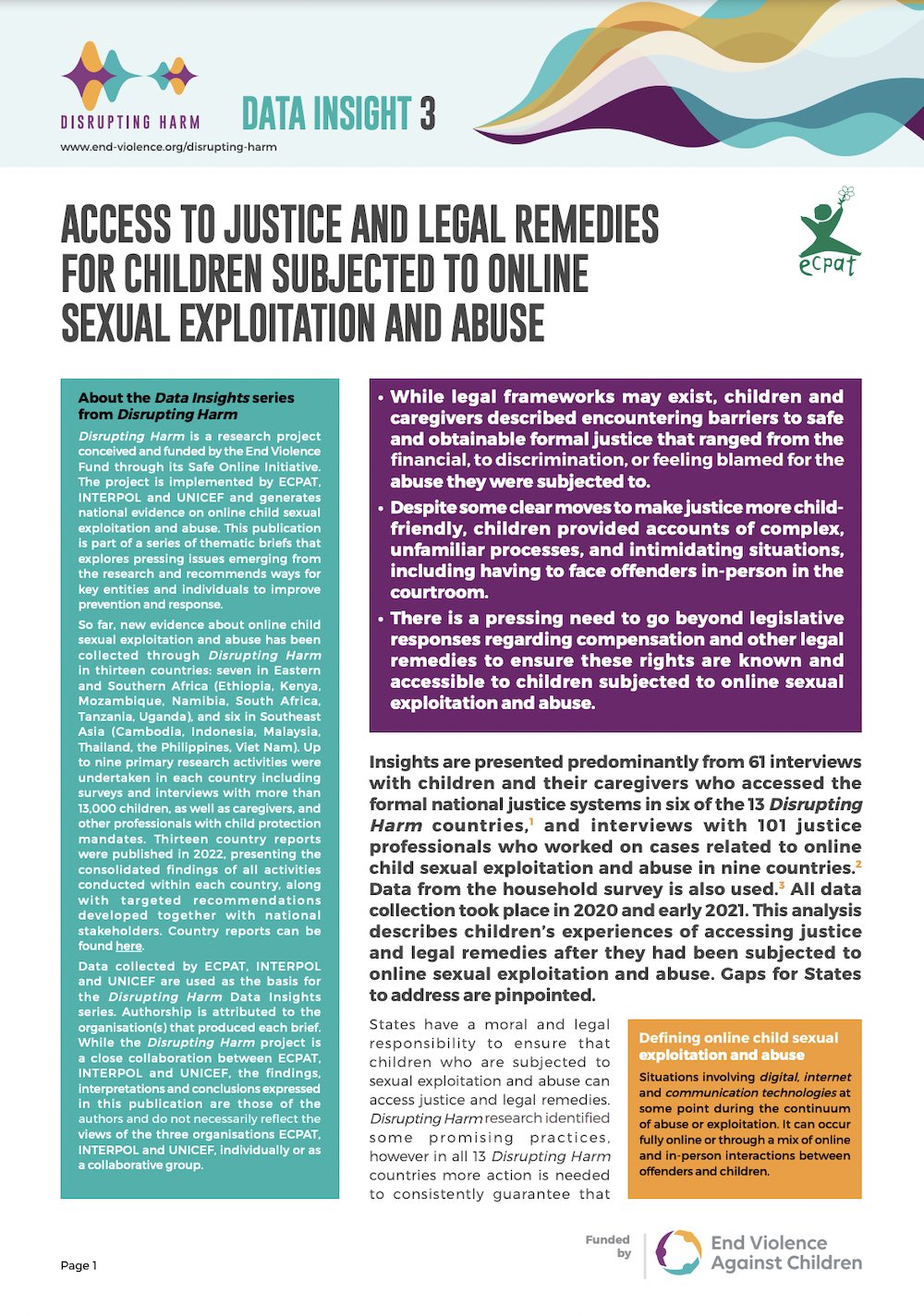
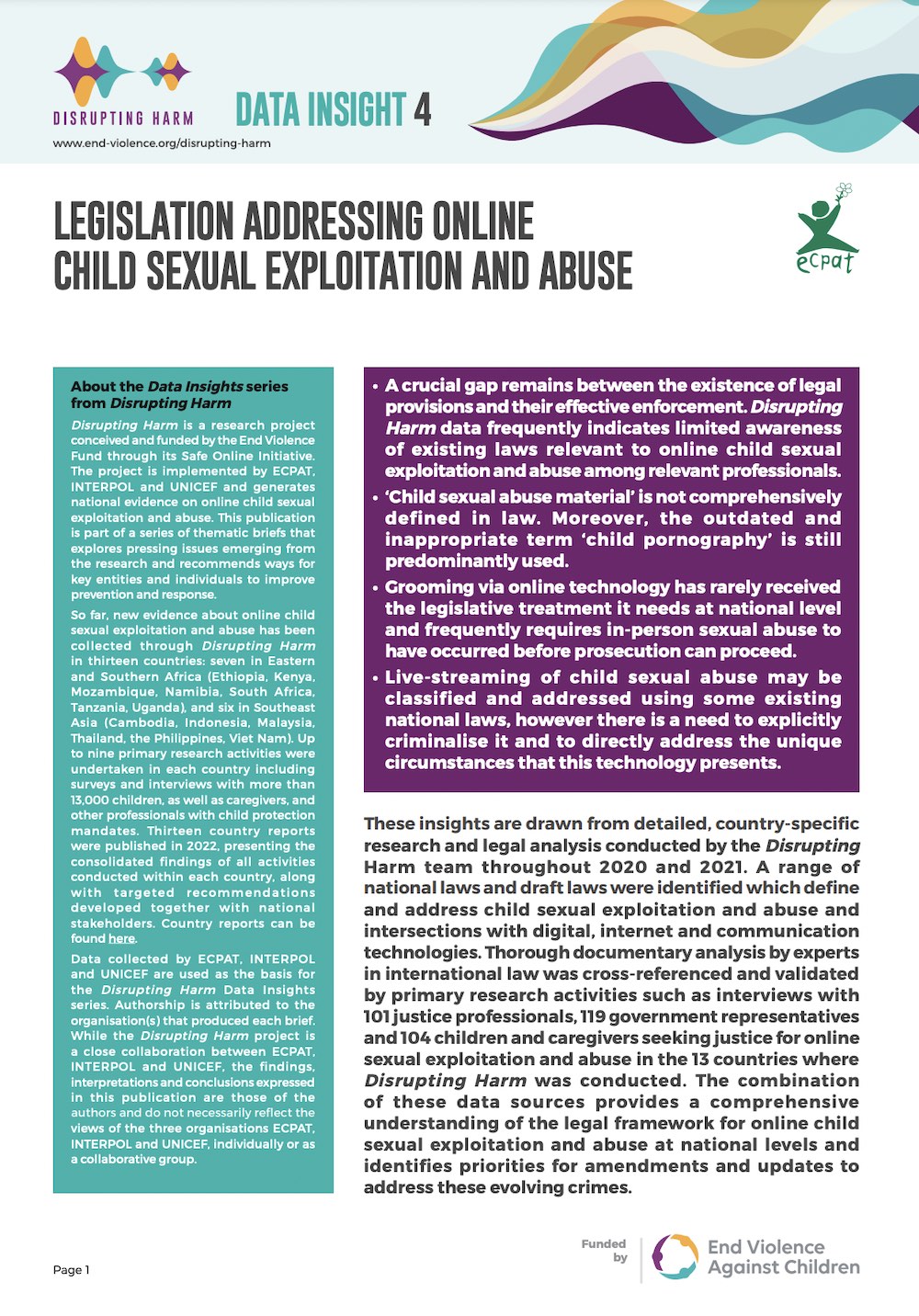
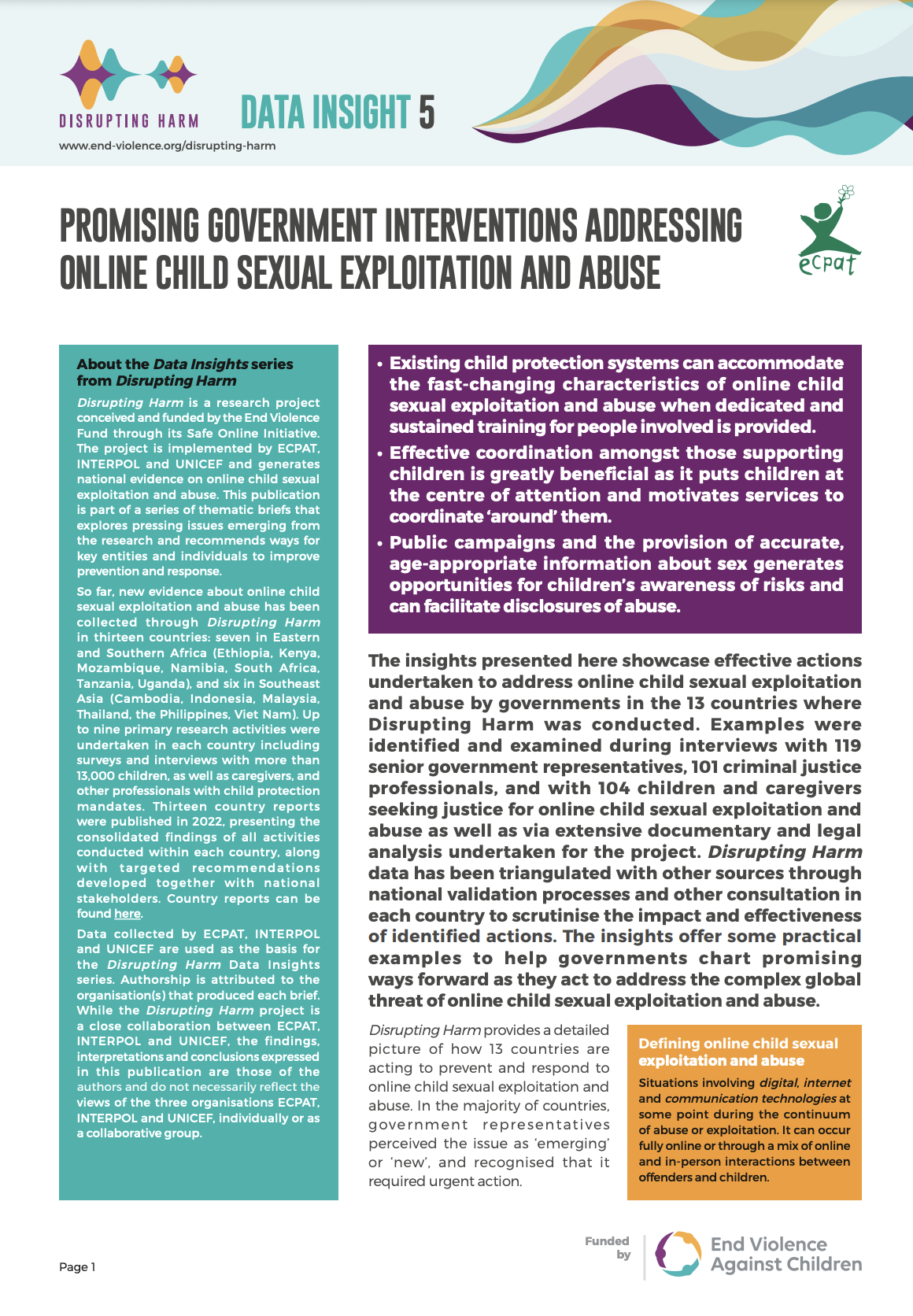
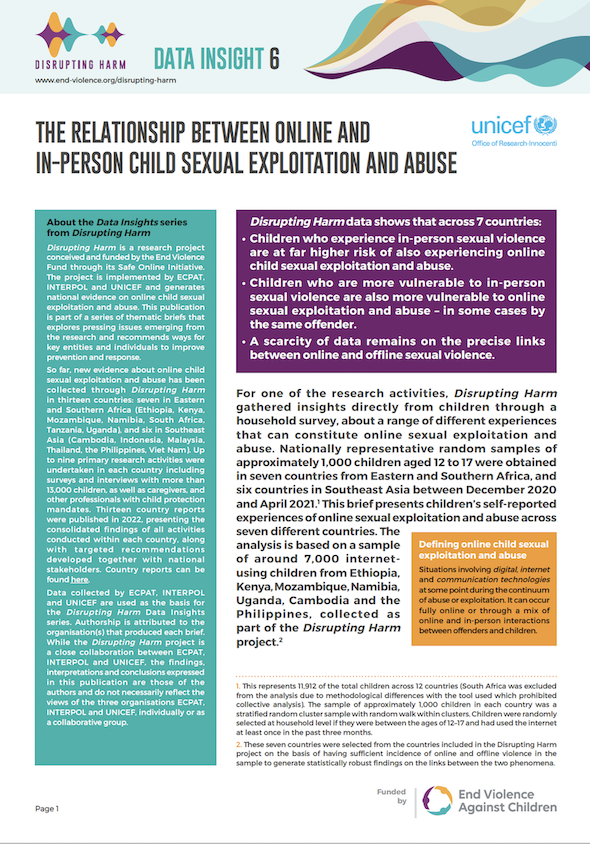
Leveraging the unique and comprehensive evidence gathered, Disrupting Harm (DH) identifies practical and actionable solutions to protect children from sexual abuse and exploitation both online and offline. The project was implemented in 13 countries across Eastern and Southern Africa. Below are reports that are now available: Kenya, Uganda, Thailand, Tanzania, Ethiopia, Philippines, Viet Nam, Namibia, Indonesia, Malaysia, Cambodia, Mozambique, and South Africa.
Disrupting Harm in South Africa is the 13 in a series of reports which shares the findings of children’s perceptions of and participation in various online practices, as well as exposes their experiences of online child sexual exploitation and abuse in South Africa.
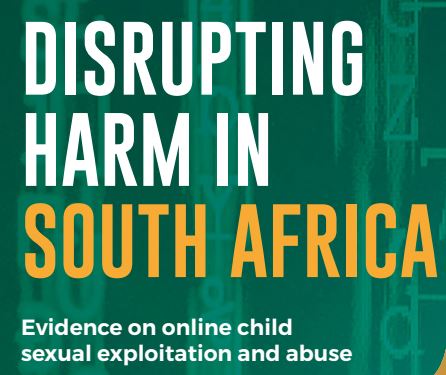 Read the South Africa report in English and Advocacy Brief.
Read the South Africa report in English and Advocacy Brief.
Disrupting Harm in South Africa has highlighted a number of key areas regarding online child sexual exploitation and abuse:
Extensive data collection took place in South Africa from early 2020 through to early 2021. Data analysis for South Africa was finalised in April 2022.
To ensure cutting edge results from this research endeavour, advice was sought from global experts on the Disrupting Harm in South Africa findings and recommendations. A list of the members of the Panel of Advisors can be found here.
Leveraging the unique and comprehensive evidence gathered, Disrupting Harm in South Africa identifies to protect children from sexual abuse and exploitation, both online and offline in South Africa. The recommendations were discussed at national consultations on 21 June 2022.
ECPAT International – carried out eleven interviews with senior national duty-bearers; carried out a literature review prior to primary data collection which consisted of comprehensive analysis of the legislation, policy and systems addressing OCSEA in South Africa; carried out data collection from non-law enforcement stakeholders; carried out a survey with 49 client-facing frontline workers to explore the scope and context of online child sexual exploitation and abuse in South Africa; interviewed ten criminal justice professionals; and carried out one interview with a young survivor of online child sexual exploitation and abuse.
INTERPOL – collected and analysed both qualitative and quantitative data from national law enforcement agencies, relevant specialised units and partner organisations to measure the scope and nature of OCSEA; and conducted a qualitative assessment on the capacity of national law enforcement authorities to respond to OCSEA cases by interviewing serving officers.
UNICEF Office of Research – Innocenti – carried out a national representative household survey of 2,642 internet-using children aged 12-17 in South Africa. Additionally, 1,393 caregivers of the children surveyed were also included in the study.
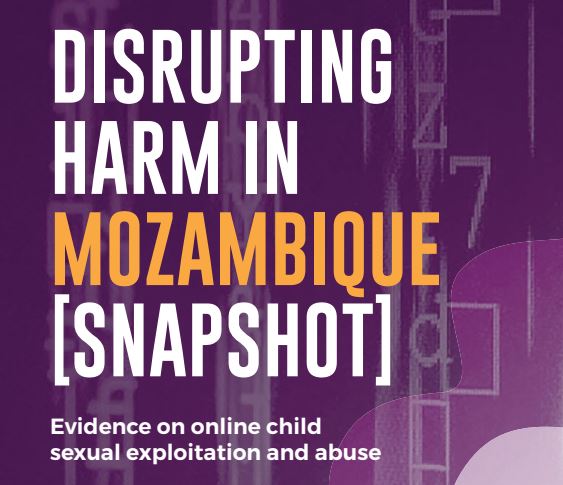 DH Mozambique report in English and Portugese and Advocacy Brief.
DH Mozambique report in English and Portugese and Advocacy Brief.
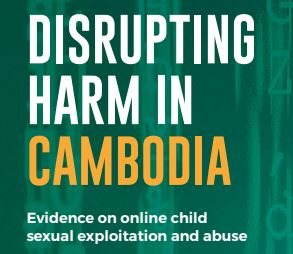 DH Cambodia Report ( Eng and Khmer) and Advocacy Brief (Eng and Khmer).
DH Cambodia Report ( Eng and Khmer) and Advocacy Brief (Eng and Khmer).
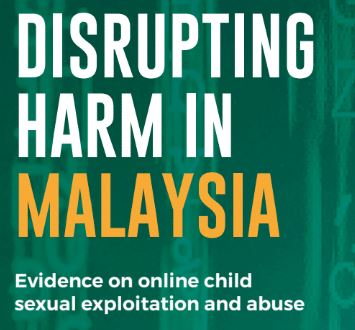 DH Malaysia Report (Eng and Malay) and Advocacy Brief (Eng and Malay).
DH Malaysia Report (Eng and Malay) and Advocacy Brief (Eng and Malay).
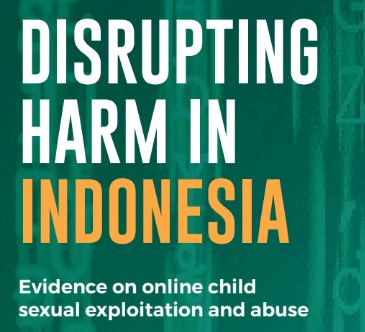 DH Indonesia Report (Eng and Bahasa) and Advocacy Brief (Eng and Bahasa)
DH Indonesia Report (Eng and Bahasa) and Advocacy Brief (Eng and Bahasa)
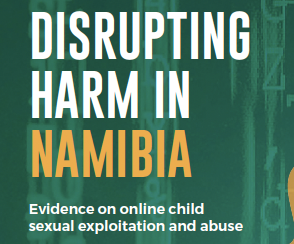 DH Namibia Report and Advocacy Brief.
DH Namibia Report and Advocacy Brief.
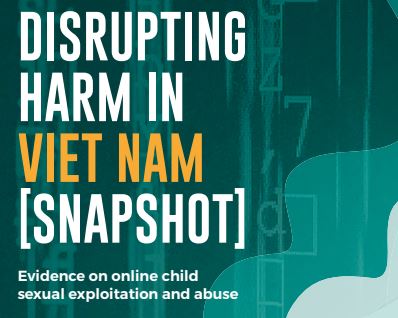 DH Viet Nam report in English and Vietnamese, press brief advocacy briefs in ENG and Vietnamese.
DH Viet Nam report in English and Vietnamese, press brief advocacy briefs in ENG and Vietnamese.
.png) DH Philippines report and press brief and advocacy brief.
DH Philippines report and press brief and advocacy brief.
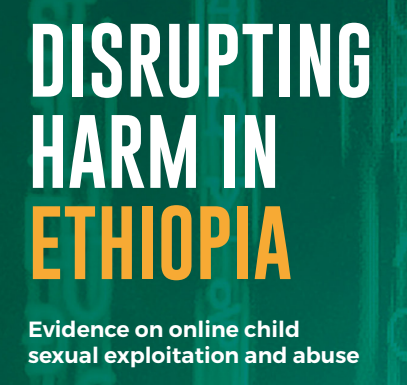 DH Ethiopia report, advocacy brief (ENG) and report, advocacy brief (AMH).
DH Ethiopia report, advocacy brief (ENG) and report, advocacy brief (AMH).
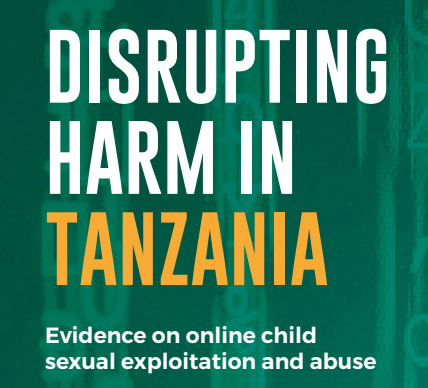 DH Tanzania report and advocacy brief.
DH Tanzania report and advocacy brief.
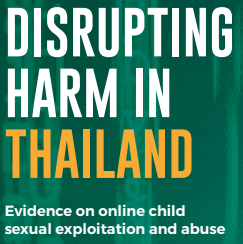 DH report, advocacy brief (ENG) and report, advocacy brief (Thai).
DH report, advocacy brief (ENG) and report, advocacy brief (Thai).
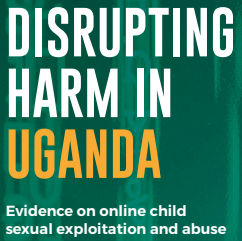 DH Uganda report and advocacy brief.
DH Uganda report and advocacy brief.
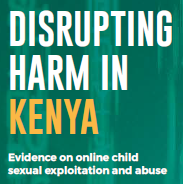 DH Kenya report and advocacy brief.
DH Kenya report and advocacy brief.
These resources are created to help partners amplify the work of Disrupting Harm, the first-ever research project of its kind. Implemented by ECPAT International, INTERPOL, and UNICEF Office of Research – Innocenti, with financial support from the Global Partnership to End Violence against Children through its Safe Online initiative, Disrupting Harm aims to better understand how digital technology facilitates sexual abuse and exploitation of children and adolescents, both online and offline.
Social media assets will be added for each major announcement and content will be regularly updated.
